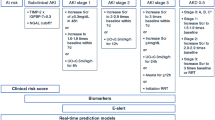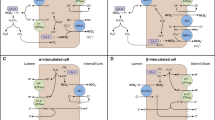Abstract
Background
The presence of ketone bodies (KBs) can interfere with creatinine (Cr) measurement in both enzymatic and Jaffe methods. Since a high proportion of children hospitalized for diabetic ketoacidosis (DKA) develop acute kidney injury (AKI), here we investigate whether KB interferences affect the accuracy of pediatric Cr measurement.
Methods
Residual patient plasma samples were pooled to make three Cr levels (~ 50, 100, and 250 μM). KBs (acetone, acetoacetate, and β-hydroxybutyrate) were used to spike the pooled samples. All samples were measured for Cr by two enzymatic methods (E1 and E2), two Jaffe methods (J1 and J2), and LC–MS/MS. LC–MS/MS was considered the gold standard, and the % difference in Cr concentration was calculated for each method.
Results
E1 and E2 were unaffected by the presence of all three KBs. J1 and J2 were unaffected by the presence of β-hydroxybutyrate. The presence of acetone resulted in dose-dependent positive interference in both Jaffe methods, whereas the presence of acetoacetate resulted in dose-dependent positive and negative interference in J1 and J2, respectively.
Conclusions
Compared to the enzymatic methods, the Jaffe methods were much more susceptible to interference by acetone and acetoacetate, especially at lower Cr values which are commonly seen in pediatrics. Interpretation of changes in Cr concentration between different hospitals when transferring patients can become ambiguous and true kidney function unclear if different methods are used without awareness of method-specific biases. To improve DKA patient care, we recommend standardizing all of the Cr methods to an enzymatic method.
Graphical abstract
A higher resolution version of the Graphical abstract is available as Supplementary information


Similar content being viewed by others
Data availability
Available.
Code availability
Not applicable.
Abbreviations
- DKA:
-
Diabetic ketoacidosis
- DM:
-
Diabetes mellitus
- KB:
-
Ketone bodies
- Ac:
-
Acetone
- AA:
-
Acetoacetate
- β-OHB:
-
β-Hydroxybutyrate
- AKI:
-
Acute kidney injury
- Cr:
-
Serum creatinine
- LC–MS/MS:
-
Liquid chromatography-tandem mass spectrometry
- E1:
-
Ortho VITROS® 5600
- E2:
-
Roche cobas® C501
- J1:
-
Beckman Coulter UniCel DxC 800
- J2:
-
Siemens VISTA® 1500
- KDIGO:
-
The Kidney Disease: Improving Global Outcomes
References
Hursh BE, Ronsley R, Islam N, Mammen C, Panagiotopoulos C (2017) Acute kidney injury in children with type 1 diabetes hospitalized for diabetic ketoacidosis. JAMA Pediatr 171:e170020. https://doi.org/10.1001/jamapediatrics.2017.0020
Weissbach A, Zur N, Kadmon KE, G, Gendler Y, Nahum E, (2019) Acute kidney injury in critically ill children admitted to the PICU for diabetic ketoacidosis. A retrospective study. Pediatr Crit Care Med 20:e10–e14. https://doi.org/10.1097/PCC.0000000000001758
Myers SR, Glaser NS, Trainor JL, Nigrovic LE et al (2020) Frequency and risk factors of acute kidney injury during diabetic ketoacidosis in children and association with neurocognitive outcomes. JAMA Netw Open 3:e2025481. https://doi.org/10.1001/jamanetworkopen.2020.25481
Kemperman FAW, Weber JA, Gorgels J, Van Zanten AP, Krediet RT, Arisz L (2000) The influence of ketoacids on plasma creatinine assays in diabetic ketoacidosis. J Intern Med 248:511–517. https://doi.org/10.1046/j.1365-2796.2000.00768.x
Greenberg N, Roberts WL, Bachmann LM, Wright EC, Dalton RN, Zakowski JJ, Miller WG (2012) Specificity characteristics of 7 commercial creatinine measurement procedures by enzymatic and Jaffe method principles. Clin Chem 58:391–401. https://doi.org/10.1373/clinchem.2011.172288
Ou M, Song Y, Li S, Liu G, Jia J, Zhang M, Zhang H, Yu C (2015) LC-MS/MS method for serum creatinine: comparison with enzymatic method and Jaffe method. PLoS ONE 10:e0133912. https://doi.org/10.1371/journal.pone.0133912
Cruickshank AM, Shenkin A (1987) A comparison of the effect of acetoacetate concentration on the measurement of serum creatinine using Technicon SMAC II, Beckman Astra and enzymatic techniques. Ann Clin Biochem 24:317–319. https://doi.org/10.1177/000456328702400312
Li D, Cheng C, Wong S, Pudek M (2017) Differential interferences of a kinetic Jaffe creatinine method by three ketones. Clin Chem 63 Supplement: A-243
Komenda P, Beaulieu M, Seccombe D, Levin A (2018) Regional implementation of creatinine measurement standardization. J Am Soc Nephrol 19:164–169. https://doi.org/10.1681/ASN.2007020156
Khwaja A (2012) KDIGO clinical practice guidelines for acute kidney injury. Nephron Clin Pract 120:c179-184. https://doi.org/10.1159/000339789
Schwartz GJ, Work DF (2009) Measurement and estimation of GFR in children and adolescents. Clin J Am Soc Nephrol 4:1832–1843. https://doi.org/10.2215/CJN.01640309
Cobbaert CM, Baadenhuijsen H, Weykamp CW (2009) Prime time for enzymatic creatinine methods in pediatrics. Clin Chem 55:549–558. https://doi.org/10.1373/clinchem.2008.116863
Laffel L (1999) Ketone bodies: a review of physiology, pathophysiology and application of monitoring to diabetes. Diabetes Metab Res Rev 15:412–426. https://doi.org/10.1002/(sici)1520-7560(199911/12)15:6%3c412::aid-dmrr72%3e3.0.co;2-8
Dhatariya K (2016) Blood ketones: measurement, interpretation, limitations, and utility in the management of diabetic ketoacidosis. Rev Diabet Stud 13:217–225. https://doi.org/10.1900/RDS.2016.13.217
Sulway MJ, Malins JM (1970) Acetone in diabetic ketoacidosis. Lancet 2:736–740. https://doi.org/10.1016/s0140-6736(70)90218-7
Owen OE, Trapp VE, Skutches CL, Mozzoli MA, Hoeldtke RD, Boden G, Reichard GA Jr (1982) Acetone metabolism during diabetic ketoacidosis. Diabetes 31:242–248. https://doi.org/10.2337/diab.31.3.242
Martinez Herrada A, Shein SL, Rotta AT (2019) Methodologic challenges in the diagnosis of acute kidney injury in children with diabetic ketoacidosis. Pediatr Crit Care Med 20:589. https://doi.org/10.1097/PCC.0000000000001926
Syal K, Banerjee D, Srinivasan A (2013) Creatinine estimation and interference. Indian J Clin Biochem 28:210–211. https://doi.org/10.1007/s12291-013-0299-y
Weber JA, van Zanten AP (1991) Interferences in current methods for measurements of creatinine. Clin Chem 37:695–700
Lee E, Collier CP, White CA (2017) Interlaboratory variability in plasma creatinine measurement and the relation with estimated glomerular filtration rate and chronic kidney disease diagnosis. Clin J Am Soc Nephrol 12:29–37. https://doi.org/10.2215/CJN.05400516
Drion I, Cobbaert C, Groenier KH, Weykamp C, Bilo HJ, Wetzels JF, Kleefstra N (2012) Clinical evaluation of analytical variations in serum creatinine measurements: why laboratories should abandon Jaffe techniques. BMC Nephrol 13:133. https://doi.org/10.1186/1471-2369-13-133
Jassam N, Weykamp C, Thomas A, Secchiero S, Sciacovelli L, Plebani M, Thelen M, Cobbaert C, Perich C, Ricós C, Paula F, Barth J (2017) Post-standardization of routine creatinine assays: are they suitable for clinical applications. Ann Clin Biochem 54:386–394. https://doi.org/10.1177/0004563216664541
Acknowledgements
The authors wish to thank Drs. Peter Skippen and Niranjan Kissoon from the Department of Pediatrics at the University of British Columbia for reviewing the manuscript, and Dr. David Seccombe from CEQAL for providing the regional Cr methodology survey data.
Funding
Damian Feldman-Kiss was awarded funding by the Summer Student Research Program, Department of Pathology and Laboratory Medicine, Faculty of Medicine, University of British Columbia, to conduct this research project.
Author information
Authors and Affiliations
Contributions
Dr. Wang conceptualized and designed the study (principal investigator). All the authors contributed to data acquisition, analysis, and interpretation. Statistical analysis was performed by Mr. Feldman-Kiss and Dr. Dubland. Mr. Feldman-Kiss, Dr. Dubland, and Dr. Wang drafted the manuscript. All the authors contributed to critical revisions of the manuscript for intellectual content and agreed to be guarantors of the work. Administrative, technical, and material support was provided by Drs. Dubland, Li, Sinclair, and Cleve.
Corresponding author
Ethics declarations
Ethics approval
Waived by the ethics board of University of British Columbia.
Consent to participate
Not applicable.
Consent for publication
Yes.
Conflict of interest
The authors declare no competing interests.
Additional information
Publisher's note
Springer Nature remains neutral with regard to jurisdictional claims in published maps and institutional affiliations.
Supplementary information
ESM 1
(PPTX 1.41 kb)
Rights and permissions
About this article
Cite this article
Feldman-Kiss, D., Li, D., Cleve, R. et al. Interference of ketone bodies on laboratory creatinine measurement in children with DKA: a call for change in testing practices. Pediatr Nephrol 37, 1347–1353 (2022). https://doi.org/10.1007/s00467-021-05324-0
Received:
Revised:
Accepted:
Published:
Issue Date:
DOI: https://doi.org/10.1007/s00467-021-05324-0




